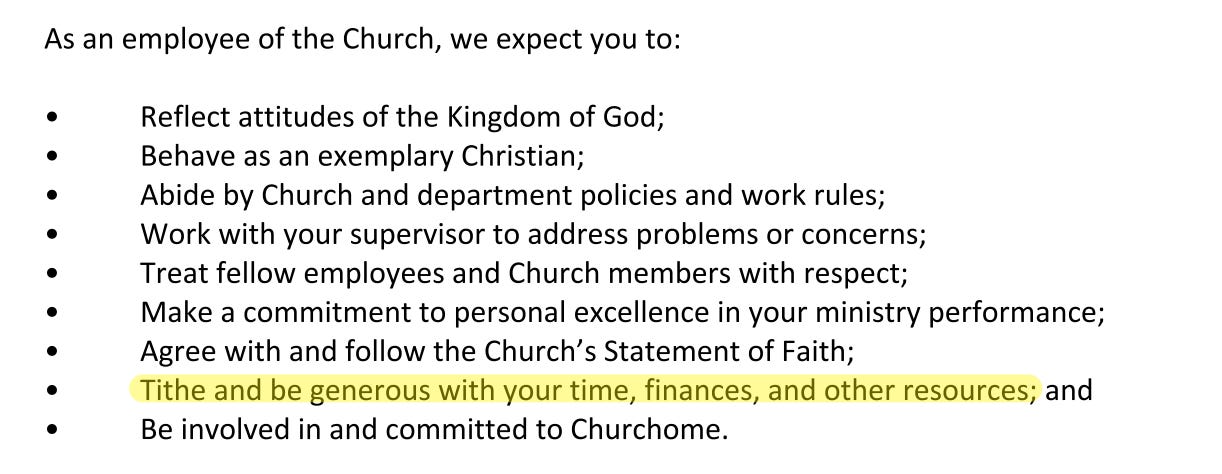Lawsuit says megachurch forced employees to tithe 10% of each paycheck
The Seattle-based Churchome never told potential employees their salaries would be a lot less than advertised
This Substack newsletter is free, but it’s only able to sustain itself due to the support I receive from a small percentage of regular readers. Would you please consider becoming one of those supporters? You can use the button below to subscribe to Substack or use my usual Patreon page!
A former staffer of Churchome, a Seattle-area megachurch, has filed a class-action lawsuit against the church, its pastors Judah and Chelsea Smith, and CEO David Kroll, claiming that they forced her to give them 10% of her paycheck in order to remain employed.

Plaintiff Rachel Kellogg worked at the church for more than two years, starting in 2019. At no point was she told that she’d be forced to tithe a minimum of 10% as part of her job, effectively reducing her monthly salary.
When COVID finally stopped in-person church services, Judah Smith told all staffers that the tithing requirement was still in effect and that some employees had already been “fired because they were not tithing.” To hammer home that point, he quoted Seattle Seahawks quarterback (and church board member) Russell Wilson, who said tithing was a “black and white” issue more important than taking communion. He also claimed the Bible said Christians should give up their possessions before failing to tithe.
Again: This was a message to employees, not church members, who are encouraged but not obligated to give. Kellogg said she agreed to let the money be automatically taken out of each paycheck.
Later that year, after a serious car accident, Kellogg faced injuries, medical expenses, and the need for a new car. It didn’t help that she was forced to move to a new, more expensive place because her previous landlord canceled her lease.
She needed whatever money she was earning. So in 2021, she stopped letting the church take that 10% from her paycheck. She was later verbally reprimanded for that decision and told to change her ways… which she promised she would do after she saved a bit of money and had more “padding” in her bank account.
By January of 2022, the reprimand was in writing. Kellogg made sporadic contributions to the church throughout the year, but it wasn’t regular and it wasn’t 10% of her paycheck. One of her supervisors, Joe Goods, told her in February of 2023 that he’d fallen under hard times in the past, too, but “he chose to sell his house” instead of not tithing… as if that’s just a normal thing everyone can do.
In a series of screenshots from the church’s Slack channel, a number of church leaders tell staff (and Kellogg specifically) that tithing is expected from everyone:
It’s just admission after admission that all employees are required to do something that was never spelled out when they took the jobs.
Earlier this month, as seen in those last two screenshots, Kellogg was given an ultimatum: Start tithing within four weeks or else you’ll be out of a job.
This wasn’t, in other words, some voluntary act of generosity, inspired by faith. This was her bosses telling her that all employees were required to give money back to the company to the point that it said as much in the employee handbook.
While the tithing was an internal policy, the church advertised job positions that were essentially overstating the salaries since the eventual paychecks would be smaller than listed. They never explicitly said in those job listings that employees would be expected to tithe.
In short: The church lied to the public about how much they were paying employees.
The lawsuit spells all this out in detail and notes that the policy violates two laws in the state of Washington. Requiring employees to give wages back to their employers is illegal, even if this is a church.
Julie Roys, who first reported on this lawsuit, notes that the church could be on the hook for a large payout if they lose this case:
The lawsuit seeks to recover “compensatory” damages equal to the amount employees paid in tithe over the past three to four years, as well as “exemplary” damages. Exemplary damages are twice the amount paid according to the Wage Rebate Act, [attorney Eric] Nusser told The Roys Report… But under the Consumer Protection Act, exemplary damages are triple the amount paid, he said. (The time period of three to four years is based on the respective statute of limitations for each law.)
…
Potential recovery amounts in this case could be large. Churchome currently has 80 to 100 employees, Nusser said. But the church recently trimmed staff after closing several Churchome campuses and moving more to an online format. So, the number of employees eligible to recover losses in the case could be “substantially higher,” Nusser said.
It’ll be up to those other former employees to decide if they want to join in on this lawsuit.
The irony in all this is that Kellogg was struggling enough that a better church would’ve gone out of its way to help her. Instead, when she was already suffering, they demanded even more. All this from a church that, in 2022, had $35,400,000 in total assets.
The church hasn’t said much about the lawsuit, but in a statement to the Seattle Times, Churchome’s attorney Nathaniel Taylor suggests that the tithing requirement falls under the church’s First Amendment freedom to hire those “who choose to abide by church teaching.” To put that another way, the church can legally restrict employment to people who oppose LGBTQ rights; similarly, they should be able to employ only those who agree to pay the tithe.
The problem with that argument, however, is that churches like Churchome don’t hide their bigotry. They say right up front, as evidenced by the job description included in Kellogg’s lawsuit, that all employees are expected to comply with “lifestyle expectations and church attendance expectations.” The job application even asks potential workers to describe their relationship with Jesus.
What they don’t say is that 10% of your paycheck goes back into the church’s bank account. That’s the problem here. If the church was honest, it may not be in this mess. Keep in mind that they could always increase the salaries to make sure the tithes don’t affect employees’ lives—or just be up front about what they’re doing.
Instead, they hide the truth until it’s too late for people to factor that into any decision about taking the job. The deception is both unnecessary and cruel. It’s also, in hindsight, very predictable.
It would be wonderful if Kellogg and other ex-employees won this lawsuit. It would be even better if it spurred similar lawsuits across the country. Because no doubt this practice is going on at other evangelical churches.
If you enjoyed this article, please subscribe to my newsletter! Do it for the kids.






So ... it's not about faith. It's not about community or fellowship. It's not about charity or helping out those who are less fortunate.
It's about the 𝗠𝗢𝗡𝗘𝗬. Always has been. Always will be.
The evangelical preachers can talk about their loving Jesus and the glorious after-life from now on, but there is nothing they crave so much as power and control in this world. Money is where is begins. That so many people willingly delegate their thinking to these churches does not fill me with hope for the future of our species.